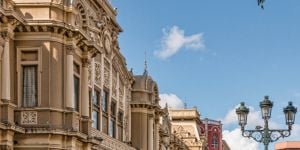How much does Canadian govt tax on International income?
Last activity 28 February 2016 by Sanbuenaventuraman
2298 Views
27 replies
Subscribe to the topic
Post new topic
How much does the Canadian govt tax us on international income ?
Can someone help me with this ? Is it a deal breaker ?
If you have declared non-resident status, as I have, you will not be taxed in Canada. If you remain a resident of Canada I do not know the answer.
Canada taxes your worldwide income at your marginal tax rate if you remain a resident. If you become a non-resident, your worldwide income is not taxable in Canada.
Why would you report income to the Canadian government that you earned in another country, although I do realize that Canada does need more money to feed and house the vast number of Syrian refugees they just took in.
Sanbuenaventuraman wrote:Why would you report income to the Canadian government that you earned in another country, although I do realize that Canada does need more money to feed and house the vast number of Syrian refugees they just took in.
Because as a Canadian resident, your worldwide income is taxable in Canada. That is the law. There are also credits that could be available for foreign taxes paid.
If you file an annual T1-General Income Tax Return YOU ARE REQUIRED BY LAW to report any foreign sourced income, no matter where it may have been earned. That does not necessarily mean you will be taxed on that income in Canada, there are many factors that determine that; the most important of which is the existence of any bilateral Tax Treaty between Canada and the income source country. Failing to report foreign sourced income as "Worldwide Income" is a crime that is subject to fine and/or imprisonment.
In most cases if you've paid income taxes on that income in another country, then you will be able to deduct that on your Canadian return.
The foregoing notwithstanding, foreign sourced income may in some cases raise you into a slightly higher income tax bracket, so you might have to pay a marginally higher tax on your Canadian income.
Cheers,
James
expat.com Experts Team
NOTE TO Sanbuenaventuraman - If you are not reporting all of your foreign sourced income to Canada Revenue Agency on your T1-General you are breaking various sections of the Canada Income Tax Act, which is a crime. I would strongly advise you not to withhold that information, it WILL CERTAINLY come back to bite you in the ass.
Thank you so much for the explanation, it would be interesting to know what benefits the Canadian government provides to people who live abroad and still send them tax dollars. I met a Chinese millionaire who has lived in Markham Ontario for twenty years, (has three stores in Hong Kong)
I asked him about paying taxes on his Hong Kong income and he laughed at me, he also collects OAP. That is why I was wondering if the tax was voluntary or not. Thanks again for the reply.
Well your Chinese millionaire friend certainly pays income tax on any CPP and OAP benefits he gets from Canada, since the tax is deducted at the source. If he has been deemed a non-resident for tax purposes then 25% is deducted and that quits any tax liablilty and he would therefore not need to file a T1-General each year. But he would not receive a refund of any kind either.
If he has any other Canadian sourced income, he would need to file a T1-General, and in that case he is required by law to report any foreign income, regardless of its nature or where earned. Failing to do so can result in severe penalties including loss of his CPP and OAP benefits if Canada Revenue Agency determined he had any outstanding tax debt.
Cheers,
James
expat.com Experts Team
Hi James, from what I understood "this man (not my friend as you say) never worked a day in his life in Canada", so he was not entitled to CPP. I think he ended up with an OAP because he was over 65 and in the country twenty years. He also got something called a supplement added to his pension, which I guess was confusing to a man with so much wealth. He said he gave every cent of his pension money back to the government "at the casino".
Well as a legal permanent resident he would qualify for OAS, don't know about the rest; especially the casino part. 
I Think alot of people don't report international income,,,isn't why the rich, who know how to screw the government, get richer ??
There must be an easy way to hide some international income !!
Good morning James,
You seem like a quy who knows what he is talking about. Would you know the answer to my question?
Does anyone from Canada have any information on protecting your credit and identity while in CR besides paying an insurance company? Is there a way to turn your credit off when you are not in your home country?
Any information would be greatly appreciated.
Thank you
If you're talking about your credit/debit card, it should be just a matter of contacting your bank and advising them you will be away from Canada and not to accept any credit card transactions or direct debit purchase until you instruct them further.
However I would wonder why anyone would do that given the inconvenience it would cause themselves. It is much easier to protect yourself by 1. never letting your card out of your sight. 2. when making an ATM withdrawal never allow anyone to stand near you where they can observe your transaction. 3 when keying in your PIN on an ATM or direct debit purchase ALWAYS cover the keys with your other hand so the PIN cannot be seen or filmed by microcameras installed in ATMs that have been tampered with. 4. If ANYTHING at all looks suspicious with an ATM move on to another. Any loose parts, unusual panels, etc., are a sign that it has been tampered with. 5. Use your credit card in preference to debit card because you can dispute any unauthorized transactions with much greater ease.
Most banks will automatically attempt to contact a card holder if any unusual transactions are made from another country, so you always should notify the bank where you're going. I had my account blocked when a ticket agent accidentally keyed in a very large amount due to a defective keypad on the card reader, while it really was a pain trying to get my account unblocked that certainly was less painful than having my account cleaned out by a crook.
Cheers,
James
expat.com Experts Team
We plan on moving permanently to CR and my concern is how do we protect our identity and credit from theft from Canada while we are living happily ever after in CR.
In Canada for instance there are people who can some how get enough information to go to the bank and mortgage your home without you knowing about it or sell it without you knowing until the new owners show up and want to move in.
Because the home was sold unless you have identity theft protection from an insurance company that will then pay for your now needed hotel and will pay for a lawyer to try and proof that your home is your home and that it was someone else who stole your identity and sold your home or mortgaged it and ran away with the money.
Because we do not plan on going back to Canada at least for awhile I was wondering if there was a way to protect these very valuable items, your identity and your credit while you are out of the country with our having to pay an insurance company in Canada for the time we are away, which we hope will be for a very long time.
Because we will still be receiving money from Canada while in CR we will have to file our taxes so I suppose that there might be some insight there if someone was tampering with our identity but the insurance costs can be up to $50.00 per month which is expensive for people like us who are on a budget.
Perhaps this doesn't happen often and that makes me happy but I just thought if someone had any knowledge on this that it couldn't hurt to ask.
Thank you
If your intention is to be a 'non-resident for tax purposes'you should read the requirements of doing so, if you haven't done so already.
If you are on a tight budget, note that the Canadian government will withhold a significant amount of your pensions...and with the dollar being what is it will make living here much more expensive than you presently realize.
Thanks, we are aware of the 25% and it is a huge bummer but have it budgeted in.
McGinn wrote:Because we will still be receiving money from Canada while in CR we will have to file our taxes so I suppose that there might be some insight there if someone was tampering with our identity but the insurance costs can be up to $50.00 per month which is expensive for people like us who are on a budget.
Even if you're on a pension the good old Canadian Loonie is currently worth 386.402 Costa Rica Colon. Let's just say you're making CAD $585.00 per month CPP benefits that's 225,978.21 CRC per month. I don't know what that would do for you in terms of the local standard of living, but assume it wouldn't be half bad. $50 a month for the insurance protection against potential losses due to identity theft and the peace of mind that would give you doesn't really seem too much in comparison when you stop and think about it in terms of the extra bang for you buck you'll get on exchange rates.
According to www.numbeo.com the average disposable monthly salary (after tax) is 457,778.00 CRC so if both of you were on the pension stated above then your income from that alone would be nearly that. According to their figures average rent on a 1br. apartment outside the city center would run you 200,000 CRC. I'm sure that numbeo is fairly accurate, and it's a site you should really look at to work out a basic budget.
http://www.numbeo.com/cost-of-living/co … Costa+Rica
I'm sure if their figures are too far out of whack one of our local members will tell you so.
Just a thought.
Cheers,
James
expat.com Experts Team
The Canadian peso sits at 73 cents US today, which is not a good time to have the Canadian government seizing 25% of pensions.
Sanbuenaventuraman wrote:The Canadian peso sits at 73 cents US today, which is not a good time to have the Canadian government seizing 25% of pensions.
Canadian taxpayers living abroad can apply for a non-resident tax reduction especially if their income consists mostly of retirement pensions. They submit a NR5 form which would be reviewed by Canada Revenue Agency.
That's exactly what I did and my withholding tax was reduced to 10%. Since my total income does not exceed the Personal Exemption I get a tax refund every year and get back every penny that was withheld in taxes during the year. For me it's just like an "enforced" savings account. It's really no big deal. Actually I live fairly well and support a wife and our young son on my pension.
So the Canadian government doesn't just seize 25% of pensions.
Cheers,
James
expat.com Experts Team
James, your comment regarding living here on 225,978.21 CRC per month, and saying " I don't know what that would do for you in terms of the local standard of living, but assume it wouldn't be half bad". Wrong...very, very wrong.
25% of your pension, will be with held...until they decide what your percentage will be, which may take quite a long time. If you don't have access to other funds, this will be major problem. Even 10% will be a problem, every month.
Thanks James, your provide great information to everyone.
To obtain legal residency here as a Pensionado, the primary applicant is required to have a 'guaranteed for life' pension of at least US$1000.
Without legal residency, you will not be covered by the healthcare system and must exit the country within the time period of on your passport without a guarantee that you will be given 9 or 90 days or even let back in, is another expense...
Also note that Pensionado status is also not granted to anyone who cannot provide a police clearance report.
Please note there is more documentation required than a police record check. The documentation is stated here.
There seems to be a bit of confusion regarding the 25% withholding tax. This tax is WITHHELD, which makes it similar to taxes deducted at source when you worked in Canada and received a T4. If you elect under section 217, you are essentially filing as a resident and you could be refunded for all or some of the amount withheld, depending on your income. There are also opportunities to reduce the amount of taxes withheld.
As a retired CA, I would strongly suggest that anyone who is becoming a non-resident to consult a tax professional such as a CPA/CA. I would not take the advice of any online "experts" alone, because everybody's situation is different. By living in Costa Rica, you are lucky because it is tax haven and one of the few countries in the world that does not tax your world income.
Here is the CRA's guide on Sec. 217:
http://www.cra-arc.gc.ca/tx/nnrsdnts/nd … 7-eng.html
I am aware that the percentage varies and you may get a refund but this doesn't help someone that has moved here on a very strict budget when every colón is accounted for. This is why I brought it to McGinn's attention when it was said they were on a budget.
I have just spent 15 months getting 'my percentage' adjusted....and hopefully will get the 'with held' amount refunded by September.
The reason I have 'continued this 'discussion' is that it is giving false expectations that one could live here for 225,978.21 CRC and "it wouldn't be half bad" Even a couple, with double that amount, would have a very hard time, doing so.
For additional info on what else must be considered please read this, especially the paragraph on 'Disposing of certain Canadian property" which many Canadians I have met, who are considering moving here, are unaware of.
I agree that anyone who is becoming a 'non-resident for tax purposes' to consult a tax professional....and all I am trying to do is provide a potential Costa Rica resident, legal or not, with information on the attached link, as a place to begin.
Our neighbours here decided to save themselves all the grief connected with living in Costa Rica full time so they only do 180 days here (as allowed by provincial law in Canada), and the other half of the year in a trailer park in Northern Ontario. This way they don't have to worry about any problems with taxes, having their government pensions lowered, and they get to keep their Ontario health care coverage. The whole Pensionado/Corportation routine down here was also something they wanted no part of. Everyone makes different choices.
Articles to help you in your expat project in Costa Rica
 The taxation system in Costa Rica
The taxation system in Costa RicaEveryone working in Costa Rica is subject to the same tax regulations, so no concessions are made for expatriates. ...
 Work in Costa Rica
Work in Costa RicaA low unemployment rate and a strong economy set Costa Rica apart from its neighbours. If you have fallen in love ...
 The health care system in Costa Rica
The health care system in Costa RicaCosta Rica has received international praise for its modern healthcare system, and both citizens and legal ...
 Key facts for international students in Costa Rica
Key facts for international students in Costa RicaCosta Rica is an attractive and affordable country in which to study, with one of the highest literacy rates in ...
 Setting up a business in Costa Rica
Setting up a business in Costa RicaThe government's positive attitude towards foreign investment, as well as the country's developed ...
 Motorcycle Angel
Motorcycle AngelMotorcycle Angel
 Buying a property in Costa Rica
Buying a property in Costa RicaCosta Rica's political and economic stability, as well as its natural beauty and pleasant climate, make it an ...
 Retiring in Costa Rica
Retiring in Costa RicaMany retirees are attracted by Costa Rica's stable democracy, excellent healthcare, enjoyable climate, natural ...
Find more topics on the Costa Rica forum



